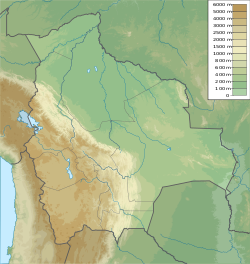The 1994 Bolivia earthquake occurred on June 9, 1994. The epicenter was located in a sparsely populated region in the Amazon jungle, about 200 miles from La Paz.[2]
| UTC time | 1994-06-09 00:33:17 |
|---|---|
| ISC event | 168418 |
| USGS-ANSS | ComCat |
| Local date | June 8, 1994 |
| Local time | 20:33:17 |
| Magnitude | 8.2 Mw[1] |
| Depth | 647 kilometres (402 mi)[1] |
| Epicenter | 13°7′S 67°3′W / 13.117°S 67.050°W[2] |
| Areas affected | Bolivia |
| Max. intensity | MMI VI (Strong) |
| Casualties | 5 dead (unconfirmed) |
The Harvard CMT Project assigned it a focal depth of 647 km and a magnitude Mw of 8.2,[2] making it, at the time, the largest earthquake since the 1977 Sumba earthquake, later superseded by more recent larger events (e.g., 2004 Indian Ocean earthquake). It is also the second largest earthquake ever recorded with a focal depth greater than 300 km, along with the 2018 Fiji earthquake,[3] the largest currently being the 2013 Okhotsk Sea earthquake. South America also experienced the then second and third largest earthquakes at focal depths greater than 300 km: Colombia, 1970; and northern Peru, 1922.[2]
Description
editThe rupture was located within the Nazca plate where it is being subducted beneath the mantle of the South American continent.[3] It shook the ground from Argentina to Canada and its oscillations were the first to be captured on a modern seismic network.[3] Such deep events are known as intraplate earthquakes because they occur within a tectonic lithosphere rather than at the boundary of two. The earthquake involved a particularly small slip area of only 30 km by 50 km. In 22 seconds, the rupture propagated with a velocity of 1.5 km/s, which is slower than the average rupture velocity of earthquakes.[4]
Implications
editPressures and temperatures at the depth of 200 to 400 miles are so great that rock should not undergo frictional sliding processes that produce earthquakes on faults at lesser depths, and the physics of deep-focus earthquakes remains a field of research investigation. The 1994 Bolivia earthquake was notable in that it excited a wide variety of Earth normal modes due to its large magnitude and depth, which were among the first to be recorded by digital very broadband global seismographs.
Effects
editThere were unconfirmed reports of five people killed in Peru's Arequipa and Cuzco provinces. Three deaths from Arequipa Province were attributed to a landslide while the other two in Cuzco Province died from falling debris or a heart attack. Many more were injured in landslides in other parts of southern Peru.[5] In Cochabamba, La Paz and Oruro, the windows in many tall structures shattered. There were unverified claims of buildings damaged in Arica, Chile, and Manaus, Brazil. Limited damage to buildings was reported in São Paulo, Brazil, and Toronto, Canada, as well.[6] In Chile, the tremors caused panic among residents of major cities, driving them out of buildings. It also disrupted power and communication services.[7] Due to the earthquake's great depth, it was felt at places far from its epicenter. A geologist with the US Geological Survey described the effects in Los Angeles, California, as a "very gentle motion". Similar effects were observed in Sioux Falls, Sioux City, Minneapolis, and Omaha in the United States.[7]
See also
editReferences
edit- ^ a b Frohlich, Cliff (2010). Deep Earthquakes. Cambridge University Press. ISBN 9780521123969.
- ^ a b c d UN DHA Information Report No.1 United Nations Department of Humanitarian Affairs
- ^ a b c Wakefield, J. (1995). "Scientists Get a Closer Look at Mechanism of Deep Bolivian Quake". Eos. 76 (2): 9–10. Bibcode:1995EOSTr..76....9W. doi:10.1029/EO076i002p00009-02. S2CID 111307538.
- ^ Zhan, Zhongwen; Kanamori, Hiroo; Tsai, Victor C.; Helmberger, Donald V.; Wei, Shengji (2014-01-01). "Rupture complexity of the 1994 Bolivia and 2013 Sea of Okhotsk deep earthquakes". Earth and Planetary Science Letters. 385: 89–96. Bibcode:2014E&PSL.385...89Z. doi:10.1016/j.epsl.2013.10.028. ISSN 0012-821X.
- ^ "Bolivia-Peru: Arequipa, Felt In N And S America". NGDC NCEI. National Centers for Environmental Information. Retrieved 16 March 2021.
- ^ Broad, William J. (April 11, 1995). "Bolivia Shakes, and So Does Theory on Deep Quakes". The New York Times.
- ^ a b "Major Earthquake in Bolivia Is Felt as Far Away as Toronto". Los Angeles Times. 1994-06-09. Retrieved 16 March 2021.
External links
edit- The International Seismological Centre has a bibliography and/or authoritative data for this event.
